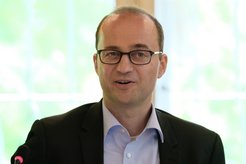Max Planck Fellow Dirk Hanschel Accepts Guest Professorship at the University of Connecticut
Max Planck Fellow Dirk Hanschel has been selected for a three-year guest professorship as Martin Flynn Global Law Professor at the University of Connecticut (USA). Hanschel leads the Max Planck Fellow Group “Environmental Rights in Cultural Context” created in 2019 at the MPI for Social Anthropology and is Professor of German, European, and International Public Law at Martin Luther University Halle-Wittenberg. We spoke with Dirk Hanschel about his appointment and his plans for his time in the United States.

Professor Hanschel, the University of Connecticut is considered one of the best public universities in the United States. How does one get selected for a guest professorship there?
I came to the position as a result of my search for cooperation partners in the field of environmental and human rights, for myself and my team. I had previously spent time as a Visiting Fellow in the School of Law at the University of Connecticut and knew that it would offer rich opportunities for interesting discussions.
So you already knew some of your colleagues at the university?
Yes, for example, Richard Wilson, who shares my interest in human rights issues and is a recognized expert on South America. He has attended conferences at the MPI and has presented his research here. I asked him whether he was interested in collaborating. And through this contact Wilson nominated me to be considered for the guest professorship – something I had not expected at all.
What responsibilities come with this professorship? Are you expected to teach courses there or carry out specific research activities?
It is of course expected that I give lectures and offer seminars for students. But not in the sense that I am required to be there for the entire semester. And since the professorship is also meant to enable collaboration with colleagues, there should be some clear research findings produced through our work together.
Do you already have plans for specific joint projects?
Yes, in addition to Richard Wilson, I will also be working with scholars such as Joseph MacDougald, director of the university’s Center for Energy & Environmental Law. Like me, he is interested in climate change litigation. This refers to lawsuits brought against states or corporations on charges of having failed to comply with responsibilities to protect the climate; the goal of such litigation is to require these entities to do more to prevent climate change and accelerate decarbonisation.
How do these lawsuits work?
The claims are filed by individuals or non-government organizations with the purpose of using legal avenues to influence political decisions or bring about political change. What particularly interests me is the way this method of litigating is developing, what legal means are used to pursue this end, and how effective they are.
Doesn’t this challenge the classic division of power in the government?
That may well be the case. In some instances the claims can result in the courts making decisions that many scholars might instead expect from the executive branch or the legislature. This is another reason why it is so important and interesting to watch and study this development.
And what role do anthropological questions play in this project?
Alongside the purely legal aspects of these environmental lawsuits, which have already been extensively studied, as an anthropologically inclined legal scholar I am interested in how people think about and conceive of environmental justice, particularly when they and their lifeworlds are directly affected by environmental destruction – for example, indigenous communities in the Amazon experiencing the effects of climate change, of mining, or of large-scale infrastructure projects such as dams.
But aren’t their legal options in cases of violation of state environmental norms the same regardless of how they think about environmental justice?
Often filing a court claim is the best option in individual cases, at least from a strategic point of view. But what I am interested in determining is whether the norms established by the state – for example, the right to a healthy environment or rights granted to nature – are in agreement with local understandings of justice or of the relationship between humans and nature, or whether they diverge or even conflict with one another. What precisely do state norms regarding environmental protection mean at a local level for those living in communities that are heavily affected by the tremendous resource use of the Global North? To what degree do these norms reflect the ways these communities understand justice? These are questions that can be best answered using anthropological methods.
